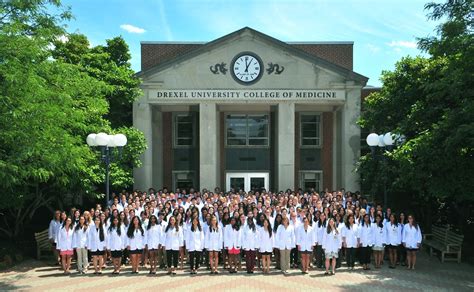Introduction
For students from underrepresented backgrounds, navigating the rigorous path to medical school can present unique challenges. The Drexel University College of Medicine (DUCOM) recognizes these hurdles and has established a groundbreaking program to empower first-generation college students with the resources and support they need to thrive in medical school.

The First Generation Pathway
DUCOM’s First Generation Pathway is a comprehensive program designed to equip first-generation students with the skills, knowledge, and confidence to excel academically and professionally. Key components of the program include:
- Mentorship: Students are paired with experienced faculty and physician mentors who provide guidance and support throughout their medical school journey.
- Academic Support: Students receive individualized tutoring, group study sessions, and personalized academic advising to help them overcome academic roadblocks.
- Leadership Development: The program offers opportunities for students to develop leadership skills through involvement in student organizations and community service initiatives.
- Financial Aid: Financial assistance is available to eligible students to help cover tuition, living expenses, and other costs associated with medical school.
Statistics and Impact
According to the Association of American Medical Colleges (AAMC), first-generation medical students face significant disparities compared to their peers. For example:
- They are more likely to come from low-income backgrounds and underrepresented minority groups.
- They have lower standardized test scores and GPAs.
- They are less likely to have had opportunities for research or clinical experience.
DUCOM’s First Generation Pathway aims to bridge these gaps and create a level playing field for all students. Statistics show that the program has a positive impact on student success:
- Increased Graduation Rates: First-generation students in the program have a higher graduation rate than their peers.
- Improved Academic Performance: Students in the program demonstrate significant improvements in their academic performance, including higher exam scores and GPAs.
- Enhanced Career Prospects: Graduates from the program are highly competitive for residency positions and have gone on to successful careers in medicine.
Benefits of the Program
The benefits of Drexel’s First Generation Pathway extend beyond academic achievement and include:
- Increased Confidence: Students gain confidence in their abilities and develop a belief that they can succeed in medical school and beyond.
- Improved Well-being: The program provides a supportive environment that fosters student well-being and reduces stress.
- Sense of Belonging: Students feel a sense of community and belonging within the program, which helps them navigate the challenges of medical school.
Common Mistakes to Avoid
When applying to or pursuing medical school as a first-generation student, it’s important to avoid common mistakes, such as:
- Underestimating Your Abilities: Don’t underestimate your potential to succeed in medical school. Believe in yourself and seek out support to overcome challenges.
- Being Afraid to Ask for Help: Reach out for help when needed. Don’t hesitate to ask for guidance from mentors, advisors, or classmates.
- Comparing Yourself to Others: Everyone’s journey is different. Focus on your own progress and celebrate your achievements along the way.
Why First Generation Matters
First-generation college students bring valuable perspectives and experiences to the medical field. Their ability to overcome challenges and succeed in demanding environments makes them exceptional candidates for the profession. In addition, they are often more likely to practice in underserved communities, addressing health disparities and improving access to healthcare for all.
Conclusion
Drexel University College of Medicine’s First Generation Pathway is a transformative program that empowers first-generation college students to achieve their dreams of becoming physicians. By providing comprehensive support and fostering a sense of belonging, the program empowers these students to overcome challenges, excel academically, and make a meaningful impact on the healthcare system.
